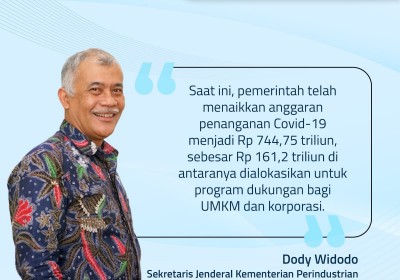Govt Drives IKMs to Enter Global Supply Chain to Help Recover National Economy
October 08, 2021
JAKARTA – To keep building a fair and inclusive industry, the government is encouraging the further development of domestic small-to-medium scale industries (IKM) so that they can become more productive and competitive in the global market. IKMs have consistently played an important role in forming the backbone of the national economy.
"Creating a fair and inclusive industry is the principle of industrial development, together with efforts to build an independent and sovereign industry, as well as to make it advanced and competitive. Empowerment and increasing the role of the IKM sector will greatly help the resilience of the domestic manufacturing industry," said Industry Minister Agus Gumiwang Kartasasmita in a written statement relating to the signing of a memorandum of understanding (MoU) regarding the partnership of Cooperatives and Small-to-Medium Scale Businesses and Industries (UMKM/IKM) for the State-Owned Enterprises (BUMN) supply chain on Friday (3/9).
For this reason, strategic steps are needed to further connect IKM actors into the global value chain. The aim is to increase the value of national exports and support the import substitution program. Data from Statistics Indonesia (BPS) show that the number of IKM business units operating in Indonesia are currently at 4.41 million, which have helped employ 15.64 million workers. IKMs were able to contribute 21.22% to the growth of the non-oil and gas industrial sector, with the most dominant sectors being food & beverage, fashion and handicrafts.
"This achievement provides IKMs with the potential to help accelerate post-Covid 19 national economic recovery efforts," explained the Kemenperin's secretary general Dody Widodo. Optimizing the performance of IKMs requires strong synergy between relevant ministries and institutions in order to create a conducive business climate, maintain social stability and develop a dynamic private sector.
"The success of our economic recovery efforts requires a substantial amount of effort, especially regarding the collaboration between all relevant parties," said Dody. The partnership agreement between IKMs and BUMNs serve as proof that IKMs are able to fulfill the high standards and conditions set by BUMNs.
"Through this partnership, we will continue to encourage more IKMs to partner with BUMNs to increase the use of locally-produced goods in BUMN operations," he said, adding that increasing competitiveness to revive the enthusiasm and welfare of UMKMs/IKMs in the middle of the Covid-19 pandemic is one of the government's priority programs.
"Currently, the government has increased the budget for Covid-19 mitigation and handling to Rp 744.75 trillion, Rp 161.2 trillion of which is allocated to support IKM and Cooperatives empowerment programs," Dody said.
Various IKM empowerment programs have been initiated by the Kemenperin, including training and mentoring IKMs to become part of the domestic and global supply chains, both through the development of supply chain ecosystems (such as link and match), as well as fostering and encouraging partnerships with large-scale industries and BUMNs, building a digital ecosystem by encouraging IKMs to enter digital marketplace platforms and getting them involved in the procurement of goods and services for BUMNs.
"The partnership between IKMs and BUMNs is expected to provide benefits for both parties," Dody underlined.
According to the secretary general, cooperatives and UMKMs/IKMs are able to access wider markets for the long term in the BUMN supply chain. In addition, IKMs can receive feedback from BUMNs to improve the quality of their products, human resources, management systems as well as improve their access to digital means to ensure competitiveness. BUMNs can also provide IKMs with guaranteed supplies of raw production materials that meet national standards so that BUMNs are able to use IKM products on a larger scale.
"In addition to being in line with the Domestic Goods/Components Usage Intensification (P3DN) policy, this partnership also supports import substitution policies, which simultaneously increases production utilization in the entire manufacturing sector," Dody concluded.
Indonesia’s Research Institutions Supporting the Development of the Electric Vehicle Industry
Indonesian Muslim Fashion and Cosmetics IKMs Shine at Dubai World Expo 2020
Govt Steps Up UMKM Transformation Efforts in the Midst of Pandemic Slowdown
Govt Encourages Promotion of IKM Products in Digital Era
Government Begins Developing Maritime Training Center in Makassar
Tweets by IDDevForum
